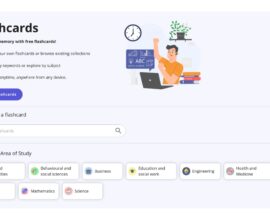A Step By Step Guide to Writing Research Papers
As you progress through university, the essays get longer, and more in-depth analysis of the topic is expected of you. Gone are the HSC days of one or two thousand words and a few quotes from Julius Caesar. You’ll be thinking deeply about topics and creating your own opinions based on the information provided. Sometimes, particularly in the humanities, you’ll be taking on the critical arguments and research papers of a field’s finest minds!
It’s common to feel a little stuck or overwhelmed when first starting a research paper, especially if you haven’t done it before. Here, we’ve compiled some steps that you can follow and get great marks for your research project. Take our word for it – breaking these massive research essays into manageable chunks is the way to go!
1. Plan Your Research Process
Remember your Six P’s: Prior Planning Prevents Particularly Poor Performance.
As soon as you receive the assignment notification for your research paper, get planning! Work out how much time you have before the essay is due, and set aside a decent chunk at the beginning to engage in your research and actively planning.
This planning stage is absolutely critical because it creates a framework for you to follow as you embark on the task ahead of you.
Be sure to allow a good week or so for your preliminary research phase, and the formation of your research paper outline.
2. Forecast: Early Brainstorming Your Research Project
Give yourself a couple of hours early on in the plan where you’re deliberately and creatively engaging with your material. Come up with a few research questions that interest you and any areas of the topic that particularly attract your attention.
This research task will be much easier – and way more fun – if you can engage with a topic or area of study that you find fascinating.
During your brainstorming session, make sure to write down all your ideas, great or small, and start evaluating them against one another. Try to come up with a thesis statement for each idea. Ask yourself how well these thesis statements engage with the research question. This will form the backbone of your research paper topic. A great place to start is with a series of questions and assumptions about the topic.
As you do this brainstorming session, it will help you ensure that you understand the essay question, if there is one. This is absolutely critical to you succeeding in your research paper.
3. Ask For Help With Your Research Paper
Struggling with the essay question? Wondering where in the labyrinthine library to start looking for sources?
Ask for help.
The faculty, your lecturers, tutors, other students, and the library staff are all there to help you find what you’re looking for. They’ll be happy to point you in the right direction.
There are plenty of options if you’re looking for help. Tutors at uni are generally a few years ahead of you in their degree, or are studying at a postgraduate level. They can be really helpful in providing pointers for your research paper.
You could also try an online resource like Zookal, where homework help and online tutoring are available.
4. Reference Research Papers Early
No matter what referencing style you’re using – Harvard, APA, Chicago, or any other – you’ll thank yourself later if you write your references out as you conduct your research.
As you’re in the research phase, identifying books, articles, and sources, be sure to properly reference in the full appropriate referencing style each source as you use it.
Make yourself a bibliography early in the piece no matter how tempting it is to leave it until last. Which brings us to…
5. Don’t Leave Things Until the Last Minute
The most important thing about making a plan is sticking to it. Make your plan and be sure to follow your steps when you said you would follow them. Don’t wait until the night before your due date to start writing.
Waiting until the last minute to get started with your writing process (or even worse, the research process) is the worst possible way to do any homework, but research essays in particular.
Giving yourself enough time lets you mull over the topic, moving from a basic understanding into a more in-depth, nuanced understanding of your essay.
6. Look in the Index
Here’s a great tip. When you’re going over your reading list, the author probably has an index of sources they used while researching your topic.
Check out that list and see if there are any sources that will be relevant to your essay question. This is a great way to broaden your bibliography while staying firmly on task.
If you’re using online sources – more on that in a minute – Wiki-style pages often have a full list of references, with links included, at the bottom of the page.
Clicking through to these references, particularly during your early research phase, is another awesome way to broaden your horizons and improve your understanding.
7. Use Reliable Sources
The internet isn’t exactly the Wild West, but there’s still plenty of misinformation out there. Google Scholar is a great source for reliable, peer-reviewed and fact-checked information sources, and perhaps one of the best search engine features out there to help you build a research paper.
Be sure that any resources you’re using online are peer-reviewed, genuine, and come from a genuine scholarly or scientific source. Be vigorous in assessing the validity and reliability of your sources.
Any website with a .gov or .edu domain is probably safe. However, Anonymous YouTube videos with caps lock titles that read “you’ll never believe number 10” – probably aren’t.
8. Research Both Sides of the Argument
Often, when it comes to research papers or planning a thesis, you need to argue a specific point. Any point that you can argue will typically have a valid counter-argument. Every single topic has people interpreting things their own way.
In academia, arguments aren’t about who’s right. It’s about evaluating the available information. Be sure to engage with and research both sides – or any other sides – of every issue, because there might be a stronger case than the one you started with.
9. Keep A Dictionary Handy
The deeper you go into a topic, the more specific and jargon-heavy the language can be. This is as true of STEM subjects as of the humanities, and being precise and economical with your language is a fantastic skill for essay writing.
We strongly recommend that you keep a dictionary (or dictionary.com) by your side as you do your research. This means you can make sure you understand every word you come across in the process of writing your essay.
Even better, you might get to use the fancy new words you learned in the essay itself.
10. Build Your Own Opinion
By now, you should be familiar with argumentative paragraph structure. State your argument, provide evidence (properly referenced, of course), explain how the evidence supports the argument, and re–state the argument itself.
Sometimes you’ll need to test your understanding with things like flash cards, and that’s OK too.
The key thing here is understanding and interpreting evidence yourself. There’s no point simply regurgitating a case that somebody else has already made.
If you’re writing a research paper, form your own opinions on the matter based on what you’ve learned during the research phase.
11. Understand Drafting
Your first draft, as they say, is your worst draft. Stephen King, one of the greatest writers of the twentieth century, is a huge advocate of a “completely raw” first draft. The first draft of your paper does not need to be perfect. Treat it like you’re Michelangelo carving beauty from a slab of marble.
When you finish your first draft – hopefully a few weeks before your thesis is due – walk away.
Don’t look at it again until the next day, after you’ve had a good night’s sleep. Read it once again, making note of anything that could be written better, and make any necessary changes.
Understanding that drafting is a process of refinement rather than one of creation is key to research paper success. Your final product will really benefit from this.
12. Read Your List Through The Semester
Your reading list for the class was compiled by the lecturer to give you a broad understanding of the topic at hand. It likely contains scholarly sources, chapters from peer-reviewed books, and other valuable resources that you can use for a research essay.
Reading the list as you go – and highlighting anything you find interesting or insightful – will prepare you well for the research process. It means you can revise, rather than learn for the first time, as you’re doing your assessment.
13. Ask Others To Read Your Final Essay
You’ve reached the Holy Grail of thesis writing. The final copy!
The final step in the process, apart from handing it in, is to ask someone to read over your essay with fresh eyes. If it’s a classmate, that’s great, and you might even offer to read theirs, too.
Odds are your final essay doesn’t need any more work, but a pair of fresh eyes can give you valuable perspective late in the game. Sometimes someone else will pick up minor spelling errors or fallacies.
Be sure to do this at least a few days before the due date. The last thing you want to happen is to need more work when your assignment is due!
Alternatively, you could try reading your work aloud!
Conclusion
Writing essays isn’t exactly easy, but it doesn’t have to be hard, either. Hopefully, you’re taking away the importance of planning, quality research, and creative thought. Research essays can be an innately rewarding form of assessment, where you test yourself, emerge with an enlightened understanding of an area of interest, and hopefully get great marks for your efforts.
Be sure that you’re familiar with your assigned textbooks, ask for help where you need it, and that you’re planning ahead to ensure you get into the essay with your best foot forward.






